US-based author Anuvab Pal feels Mithun Chakrabarty-starrer Disco Dancer is the worst film of the 1980s. Yet, he chose to write a book on this very film, with the screenplay, trivia, and interviews from the hero Mithun, music composer Bappi Lahiri and director B Subhash.
Pal, incidentally, has also written films like Loins Of Punjab Presents and The President Is Coming.
Here's an excerpt from the book Disco Dancer: A Comedy In Five Acts -- an interview of Bappi Lahiri, who owes his career to this film:
Bappi Lahiri
Music Composer
Padma Bhushan Winner
Composed music for over a 1,000 Bollywood and regional films, including Disco Dancer
A Guinness World Record Holder
No other introduction required
The only direction I had to the legendary Mr Bappi Lahiri's house was that it was near yesteryear star Jeetendra's house in the Juhu suburb of Mumbai. A particular oddity of Juhu landmarks is that they usually centre around forgotten movie star homes, rather than street signs or house numbers or real landmarks like an important intersection or a massive hotel (both of which exist prominently).
So with Mr Lahiri, I was told to take a left from a piano repair shop, follow an arrow leading to a pizza delivery place, ask about Jeetendra's bungalow and then ask again from there. Of course, had Mr Jeetendra (which wasn't even his real name) known the important role he would play in city navigation in the winter of his life, he would have perhaps taken his acting career in B-grade classics like Mawaali (Ruffian) and Justice Choudhury (self-explanatory) far more seriously.
So there I was in front of an imposing bungalow which didn't have a plaque saying 'Jeetendra's Bungalow' but said 'Prem Milan' ('Lovers Unite') instead. A cluster of people who do nothing on every Indian street corner confirmed this was indeed the residence of the star (a home pseudonym, how original I wondered) and then pointed vaguely to some parallel road that led to Mr Lahiri's mansion.
After following their often contradictory and meaningless directions, I found myself outside a bungalow which read 'Lahiri House'. It looked a lot like the bungalows movie people built in the '70s, and often used for shooting in the '80s (as the villain or rich man's house). Two storeyed, art-deco. It was of an India when bungalows rather than luxury apartments with pools and gyms, symbolized wealth.
Inside, I was asked who I was. I told them. The little security room didn't have security guard, it had a man and a woman seemingly terrified. So terrified that after I had mentioned 'Anuvab Pal' about fifteen times and they did manage to connect to the great man himself (who seemed to be sleeping, it was 2 pm, quite natural), they forgot the name out of nervousness. And dropped the phone. Incapable of further language and fearful, they made some sort of head gesture suggesting I should pick up the phone with the subtext being, 'You play with fire'.
'Anuvab Pal,' I said again, still somewhat certain that that my name (although I was beginning to have second thoughts). Instructions were given, I was led to a garden-facing living room on the ground floor.
Excerpted from Disco Dancer: A Comedy in Five Acts, by Anuvab Pal, HarperCollins India, with the publisher's permission, Rs 250.
The birth of disco
Image: Bappi LahiriNow, during the walk, on either side of me, what I saw could be best described as gnomes. Not real gnomes. The American travel website Travelocity had a series of relatively famous advertisements featuring a traveling garden gnome. This looked like that. It was a garden gnome, a little sculpture in ceramic.
But not of a random old white man but of Bappi Lahiri himself, wearing tuxedoes of different colours, almost as if fourteen midget marble versions of him, or a series of oversized tiled Bappi Lahiri action figures, wee welcoming you into a room whose central decoration you were manipulated into observing -- a wall with two roman columns on either side. The wall had a huge framed photograph. In the photo were three people -- Mr Lahiri, Sonia Gandhi and Jay Z.
When I mentioned this to people afterwards, they said that it must have been photoshoped, which makes one wonder why and what about that specific combination would please its creator, which by default, one could assume to be the great man himself.
The decor of the living room could best be described as velvety-beige. The curtains and upholstery were beige. And the sofas were easy to sink into (I did). The curtains were drawn, making a possibly airtight room, den-like. As were Mr Subhash's. It suggested to me that something about fresh sunlight didn't please our '80s' cinema maestros.
In the corner, sat a Yamaha synthesizer under a print of Mona Lisa. The wall was filled with gold and platinum discs; the most notable among them was a photo of him with Michael Jackson nestled between a gold disc for a film titled Hatya and another tiled Habiba.
On another wall, there was a large photograph of him with the words 'BAPPI LAHIRI - SPAGHETTI DISCO STRAP', inexplicably, under it.
He entered about forty-five minutes later, in a FUBU track suit, dark blue. He was exactly like his photographs --indescribable.
His mullet was as rock-solid as a Himalayan mountain and his dark glasses were in place. He was shy and courteous. I did not see any of the infamous jewellery.
ME: How did you create disco music in India?
BAPPI-DA: What is the meaning of disco? There is a disc. A big disc. When you play it and it rotates, when they play in nightclubs, that's disco. I went to Americain 1979 and there was a big hit film, Saturday Night Fever, John Travolta. I came back and I signed a film called Suraksha. (Begins singing), 'Mausam hain, gaane ka, bajane ka, sunane ka '
ME: It was a spy film.
BAPPI-Da: From this movie, disco music started. Then I did Taqdeer Ka Badshah. Suraksha was a superhit, Taqdeer Ka Badshah didn't do so well, then Disco Dancer, massive hit. So that was the birth of disco.
ME: It is rumoured that when you and Mithun Chakravarty landed in Kazakhastan, there were bigger crowds for you than the country's president who was giving a speech the same day. Is this true?
BAPPI-DA: Yes.
'Rahman combined three of my songs and got Best Original Score'
Image: A scene from Disco DancerME: Disco Dancer is a global phenomenon. Why do you think this is? It was a hit in India but three generations later, it is still popular. Why did this story stay on with people?
BAPPI-DA: Disco Dancer's biggest thing is the last sequence. Till today, there has not been a climax that has been captured with music. Start with the disco composition, then Kim is coming. (Sings) 'Jimmy Jimmy aja aja'. Then he is still not singing. Then Rajesh Khanna comes -- Gaa Beta Gaa' -- (sings) 'Goro ki na kaalo ki' -- 'Gaa Beta Gaa!' Throws a guitar at him. Frees him.
Then Mithun starts: (Sings) Yaad aa raha hain. The whole climax is woven around these songs. Today, people don't want to listen to even one song in a movie. There are two movies, I remember: this one and Pag ghungroo bandh meera naachi -- a twelve-minute song that traced Amitabh. It is still a history. And Disco Dancer, this sequence is also history, Rajesh Khanna gets shot, and the whole end, I bring it into music.
ME: And Mithun's psychological trauma, he got over that by playing the guitar.
BAPPI-DA: Correct.
ME: His mother got electrocuted by the guitar.
BAPPI-DA: Every time he saw a guitar, he thought of his mother. She was electrified. She died.
ME: You had a range of songs. 'Owwa Owwa, Bang Bang', which Karan Razdan sings.
BAPPI-DA: I also had this song (sings) 'Eh-Oh-Ah. Ah-Oh-Aha. Zara Mudke.. tak, tak, tak, tak, dish, dish ' (mimes drums)
The whole film I advanced with a music (pauses) with music. A poor boy is thrown out, society throws him out, 'Tera Ma Chor Hain, Tera Ma Chor Hain'. He goes to Goa, (drum mime) tik tik tik, keeps dancing, How a star is born. When he becomes famous, his mother is killed -- jealousy.
ME: There's a rival dancer.
BAPPI-DA: They hit him. Break his legs. The whole thing I brought out through music. Many old films, like Mughal-e-Azam, Pakeezah, Anarkali, which are musicals, wee done. But modern music, a modern musical, through the whole film, I don't think anyone has created like this. I created modern music like a garland.
ME: What made you anticipate that disco was the next big thing?
BAPPI-DA: (sings) 'I am a disco dancer. Zindagi mera gana. Mein zindagi ka diwana. Ke Jhumo, Ke Nacho '
Look at the range of musical styles just within that song. So much so that some people picked up a thread of tune within the song, just two lines of lyrics and stole it and made a song. (sings) 'Jawani ek leher, Jawani ek nasha'.
In Kaante, (sings) 'Rama ho rama re. Aage to dekha rama re', there is a song. They copied my music. It became a hit. Just a fraction of the tune was enough to make it a hit.
Today, Oscar has been given to A R Rahman. (sings) 'Ringa Ringa Ringa Choli ki peeche kya hai' -- What's the difference? Exactly the same. Also, 'Jai ho.' I did 'Ramba ho' in 1985. Rahman combined three of my songs and got Best Original Score. The 'Ho' came from me. Who brought it? Bappi Lahiri brought the ho to Bollywood.
For Disco Zamana, Usha Uthup got the number one nomination in Filmfare. What I have done twenty-eight years before, that's what is running. See, we know what's been taken. We know what song is what. They don't know. The film is such a big hit that with the picture, the song has escaped. The song is not original. The song has been very cleverly copied, layered, we understand, he hasn't copied note for note.
Now, I have done Chandni Chowk to China and Mein Aur Mrs Khanna, I have 461 movies in Telugu, Tamil, Malayalam, Bengali, astounding songs, hundred hits. I am at such a level that I understand where you were inspired from. You have gotten awards, very good, he is a good man, very talented. But in Disco Dancer's time, this thing wasn't there -- worldwide link-ups -- Hollywood and Bollywood. Back then, in the time of Namak Halaal, all this wasn't there. I have done Sharaabi. Now, if a film like Sharaabi doesn't get an Oscar, the Oscars have no value. I have got, that time, all awards from Sharaabi. All songs are original.
ME: And brilliant.
BAPPI-DA: I have got all awards from Sharaabi. (sings) 'Chalte chalet, mera geet amar rehena (sic), Kabhi alvida na kehna ' that's original -- that is called original score. Immortal.
'Every one of Mahesh Bhatt's films is copied'
Image: Poster of Disco DancerMe: Sri Lankan-British musician MIA recently did a version of 'Jimmy Jimmy'.
BAPPI-DA: Copied. Remixed.
ME: Did they tell you?
BAPPI-DA: Yes. No. Oh, you don't know, Adam Sandler's last film...
Me: Funny People...
BAPPI-DA: No, the one before that. Wait (he calls someone). Don't Mess With The Zohan. They used the song. My name is there. Bappi Lahiri. Marion Curry (sic). All these big artists' names are there. They took pieces of my disco music. Just the tune.
ME: Also, more famously, 'Kalyon ka chaman' was redone by Dr Dre?
BAPPI-DA: I sued them. They took Lata's voice, American top rappers copied it. So many songs of mine. 'Jimmy Jimmy' has gone through postmortem. In Adam Sandler's movie, you can't believe it, you will be shocked. You must mention this. In Hollywood, 'Jimmy's interlude has been used as music while Adam Sandler is fighting. They have given credit -- original score Bappi Lahiri.
ME: 'I am a Disco Dancer' has also been used by Hollywood?
BAPPI-DA: It's there. It's there.
ME: In today's movies, there is a shying away from music. Urban multiplex cinema is trying to appeal to young audiences with movies without songs. What's your view?
BAPPI-DA: Bollywood is trying to copy Hollywood. I mean, every movie is a copy. Any picture like Ghajini. Every one of Mahesh Bhatt's films. They feel they will make movies like Hollywood without music. But music has a huge resale value in India.
See today, 3 Idiots is a super-duper hit. But if its songs were more memorable, it would be an even bigger hit. In six months, 'All is well' people won't remember, that's today music, but take (sings) 'Aa dekhe zara, kismet kitna hian dum', R D Burman, people will still sing. (Sings) 'Oh haseena zulfowaali' 'Piya tu ab toh raja', still in functions it's sung. (Sings)
I went to Russia and sang (sings) 'Raat baaki, baat kaaki. Hona hai jo, ho jane do'. Russians went mad. These songs, any function, any nightclub, twenty-eight years later, still works.
'Mithun still says, because of Bappi-da, I'm still a disco dancer'
Image: Poster of Disco DancerME: Where did you hear the story of Disco Dancer? What made you want to compose the score?
BAPPI-DA: When B Subhash told me the story, I used to live in a flat. The whole story I inhaled and enhanced. So the songs I've given, it seemed that this movie needed exactly and only these songs. And thanks to Anjaanji, he was the lyric writer.
I have a film releasing latest called It's Rocking, Dard E Disco, where I have done work as an actor, I have done the role of a Disco King, there are many artists also in the film. There's an item I have sung, new song, as Disco King, 'Pyar karlo naa'. And in the middle of it, I started singing 'Yaad Aa raha hai', the climax song from Disco Dancer. Believe me, I was recently shooting and people started dancing. In a new song, in the middle of it, I have remixed and put it in.
ME: The media call you the King of Disco.
BAPPI-DA: They call me King of Disco not for one song. Suraksha, Disco Dancer, Pyara Dushman, Disco Station.
ME: Disco Station?
Bappi-da: Yes, Disco Station. Dance Dance, Kasam Paida Karne Wali Ki, (sings) 'Yaar bina chain kahan re ' Bengali folk song I made into a disco song. Twelve films phenomenal disco hits. That's why. Disco means me. After that, Yarana came with lights, (sings) 'Saara zamana', then Qurbani, (sings) 'Aap Jaisa koi', lots of songs came. But the beat came from me. [Author's Note: Qurbani was released in 1980 and Yarana in 1981.]
ME: What was the collaboration like between B Subhash, you and Mithun?
BAPPI-DA: I am thankful to Mithun Chakravarty. The song I created would not have been the same if I didn't have a great dancer like Mithun Chakravarty. He still says, because of Bappi-da, I'm still a disco dancer. Today he is a dance king, Dance India Dance main judge, why? Disco Dancer is a phenomenal hit. With the strength of his feet, he has justified the songs, my creations. If in that role, a rubbish artist had come, it would have been a flop. It's all teamwork. Thanks to Subhash, Mithun.
ME: If the movie released today, do you think it would be as big a it as it was then?
BAPPI-DA: The present generation don't know Disco Dancer. They know the song. They are dancing. But they
don't know.

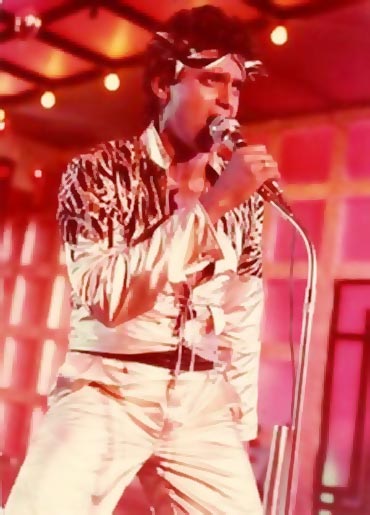
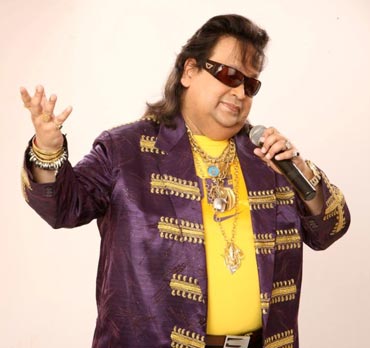
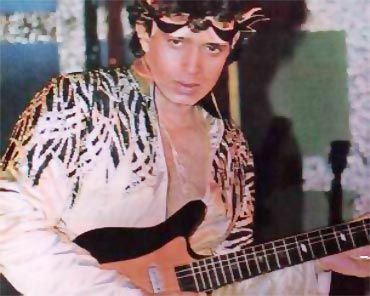
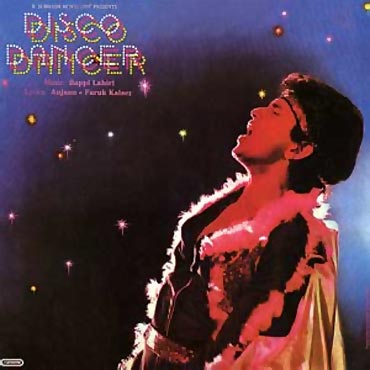
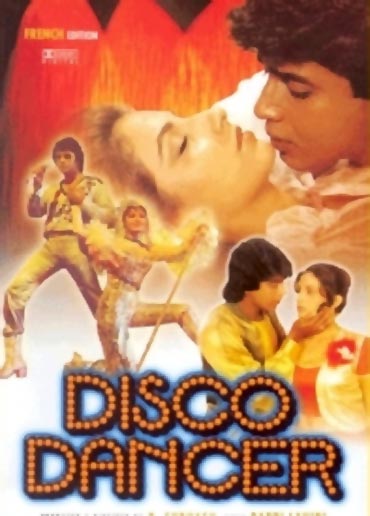
Comment
article